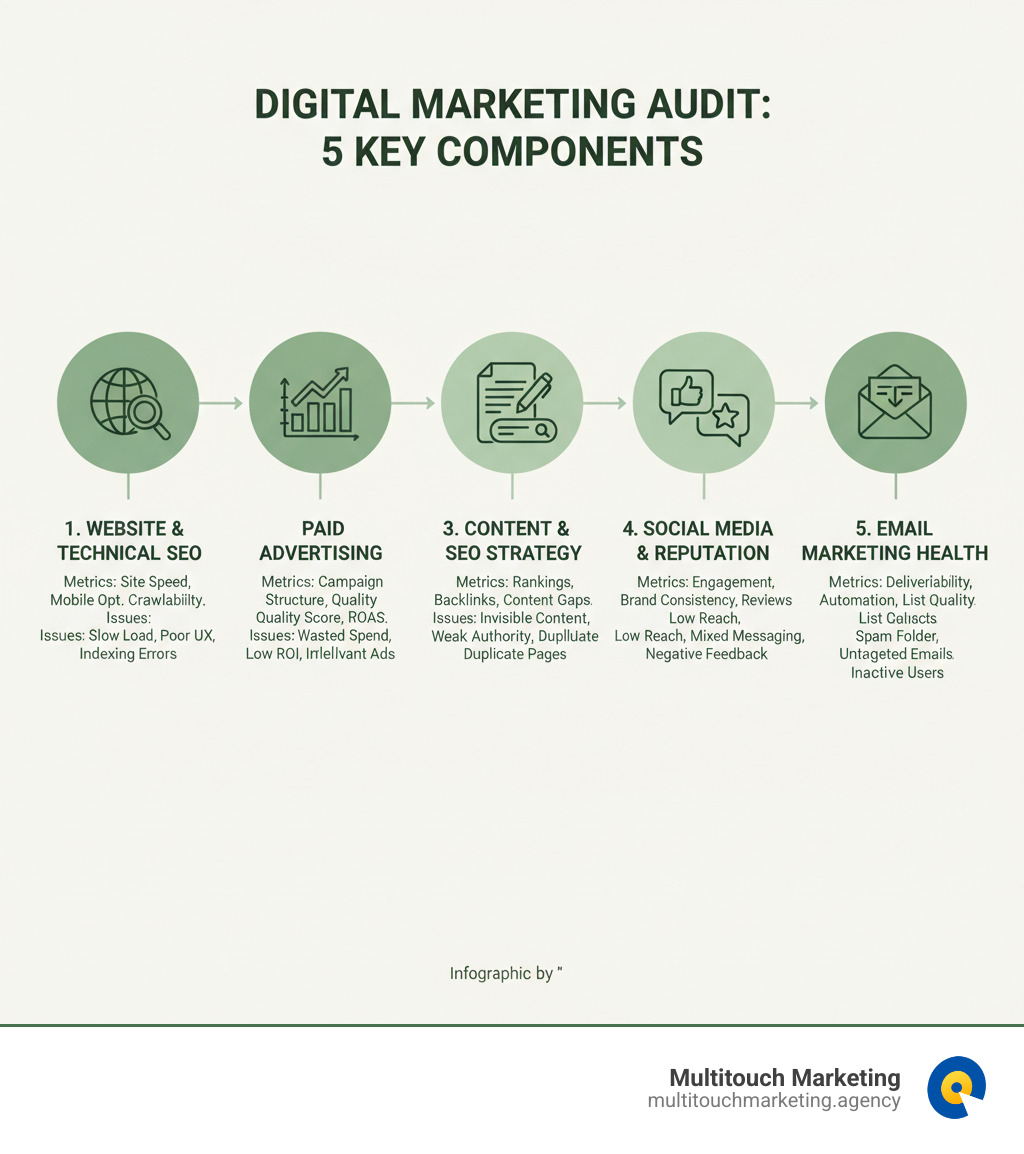Why Every Business Needs a Digital Marketing Audit
A digital marketing audit is a systematic evaluation of your online marketing efforts across all digital channels. It examines what’s working, what’s broken, and where opportunities exist to improve performance and ROI.
Quick Answer: What a Digital Marketing Audit Includes
- Website Performance – Speed, mobile-friendliness, user experience, technical SEO
- SEO Analysis – Rankings, backlinks, on-page optimization, content quality
- Paid Advertising – Campaign structure, keyword performance, Quality Score, ROAS
- Social Media – Engagement rates, audience growth, brand consistency
- Email Marketing – List health, open rates, automation effectiveness
- Analytics & Tracking – Data accuracy, conversion tracking, attribution models
- Competitive Benchmarking – How you compare to competitors in your space
If your digital marketing feels like it’s running on autopilot without delivering results, you’re not alone. The problem is often a lack of clarity, not a lack of effort. An audit cuts through the noise, telling you which campaigns are draining your budget and which technical issues are killing your traffic.
The stakes are high. A single second of page load delay can reduce conversions by up to 20%. Your paid ads might be targeting the wrong keywords, or your content could be invisible to search engines. The good news is that most of these problems are fixable once identified.
An audit provides a roadmap, changing vague concerns into specific, actionable tasks: fix broken conversion tracking, pause underperforming ad groups, and optimize slow-loading pages. This guide walks you through the complete process, from preparation to implementation, so you can turn findings into measurable improvements.
The Foundation: Preparing for Your Digital Marketing Audit
Before diving into analytics, it’s important to know when you need an audit and how to prepare for success.
Signs You Need an Audit
Think of a digital marketing audit as a health check-up for your online presence. The most obvious warning signs are stagnant growth or declining performance. If your website traffic has flatlined, lead generation is down, or your cost per acquisition (CPA) is rising, it’s time for an audit. Other key indicators include a declining return on investment (ROI), an unclear or disconnected strategy across channels, and falling behind on industry trends.
An audit isn’t about pointing fingers; it’s a strategic imperative for finding clarity and driving long-term success in a competitive market.
Data-Driven Process
Every audit should be built on a foundation of data, not gut feelings. We look at the numbers, analyze trends, and dig into the “why” behind performance. This means diving deep into analytics, scrutinizing campaign data, and benchmarking against industry standards. We also view everything through the marketing funnel framework (Awareness, Consideration, Conversion) to evaluate the customer journey and identify where prospects are getting stuck.
Defining Clear Objectives and Choosing a Framework
Before pulling data, define what you’re looking for. Are you trying to increase leads, improve conversion rates, or reduce ad spend? Make your objectives SMART: Specific, Measurable, Achievable, Relevant, and Time-bound. For example, instead of “improve SEO,” aim for “increase organic traffic by 15% within six months.”
We frame objectives using the marketing funnel:
- Awareness: How effectively are you reaching potential customers?
- Consideration: How well are you nurturing interest?
- Conversion: How efficiently are you turning prospects into customers?
Frameworks like RACE (Plan, Reach, Act, Convert, Engage) or a channel-specific approach can structure your audit. As Harvard Business School notes, defining clear objectives is an essential first step. The best framework aligns with your business goals.
The Role of Data, Analytics, and Tools
Effective marketing requires proper data and analytics. The first step is data consolidation, gathering information from all channels into one place to get a holistic view. Google Analytics is your primary tool for understanding user behavior, while Google Search Console is essential for monitoring organic search performance.
Consistent use of UTM parameters across all campaigns is non-negotiable for accurate traffic and conversion attribution. You must also assess your data accuracy, as bad data leads to bad decisions. The right tools, combined with an understanding of AI in Marketing Analytics, empower you to uncover hidden insights.
| Audit Type | Free DIY Audit | Paid Professional Audit |
|---|---|---|
| Cost | Free (your time) | $500 – $10,000+ depending on scope |
| Depth | Surface-level insights | Comprehensive, channel-specific analysis |
| Tools | Free tools (Google Analytics, Search Console) | Premium tools + expert interpretation |
| Expertise | Your team’s knowledge | Specialized audit experience |
| Time Required | 10-20 hours | Delivered in 1-2 weeks |
| Best For | Small businesses, basic understanding | Growing businesses, strategic optimization |
The Comprehensive Channel-by-Channel Audit Process
Now we systematically examine each marketing channel to uncover what’s working, what’s broken, and where your biggest opportunities lie. This is like a home inspection for your digital marketing—looking beneath the surface to ensure the foundation is solid.
Website and Technical SEO Audit
Your website is your digital foundation, and technical issues can silently cost you traffic and revenue.
- Website Speed: A 1-second delay can reduce conversions by up to 20%. Use tools like PageSpeed Insights to identify what’s slowing you down, such as large images or bloated code.
- Mobile-Friendliness: With most web traffic coming from mobile, a poor mobile experience is unacceptable. Ensure your site has a responsive design and is easy to use on small screens. Our Responsive Web Design SEO services can help.
- User Experience (UX): Is your site easy to steer with clear calls-to-action? A site’s design heavily influences its credibility. Analyze user behavior to spot friction points.
- Technical Health: Check for crawlability by reviewing your
robots.txtfile. Ensure your XML sitemap is accurate and submitted to Google Search Console. Your site must use an SSL certificate (HTTPS). Finally, fix broken links and redirect chains to improve user experience and SEO. Regular Website Maintenance is key.
SEO and Content Marketing Audit
SEO requires ongoing optimization. An audit should examine both your technical foundation and your content strategy.
- On-Page SEO: Review title tags, meta descriptions, headings, keyword usage, and internal linking. Assess if your content is relevant and valuable to your target audience. Our SEO Content Optimization Tips offer practical guidance.
- Off-Page SEO: Analyze your backlink profile for quality and quantity. Backlinks signal trust to search engines. Identify toxic links to remove and opportunities to earn high-quality links.
- Content Performance: Analyze traffic, engagement, and conversions to see what content resonates. Identify content gaps in the customer journey and prune outdated or low-value pages.
- EEAT: Evaluate how well your site demonstrates Expertise, Experience, Authoritativeness, and Trustworthiness—a key factor for Google. See how you measure up with our Free SEO Audit.
Paid Advertising (PPC) Audit
Paid advertising can be a direct pipeline to sales, but it can also burn through your budget. A PPC audit separates profitable campaigns from money pits.
- Campaign Structure: Well-structured accounts can lower acquisition costs significantly. We check for logical campaign organization and tightly themed ad groups.
- Keyword Performance: Analyze which terms drive valuable traffic based on search intent. Refine bid strategies and build negative keyword lists to eliminate wasted spend.
- Quality Score: This is Google’s report card for your ads. A high score means lower costs and better ad positions. We evaluate ad relevance, expected click-through rate, and landing page experience.
- Ad Copy and Landing Pages: Ad copy must be compelling and relevant. We analyze ROAS (Return on Ad Spend) to connect ad investment to revenue. Your landing pages must align with your ad copy and be optimized for conversion.
For a detailed breakdown, see our Google Ads Account Audit Checklist. We also offer expert PPC Audit Services for businesses in Raleigh, Durham, and Chapel Hill.
Social Media and Online Reputation Audit
Social media is about building relationships and managing your brand’s perception online.
- Channel Performance: We review your presence on all platforms (Facebook, Instagram, LinkedIn, etc.) to ensure you’re on the right channels for your audience.
- Engagement Rates: We look beyond likes to comments, shares, and saves, which indicate your content is truly resonating.
- Brand Voice and Strategy: Your brand voice should be consistent across all channels. We also evaluate how your paid and organic social efforts work together.
- Online Reputation: Monitor brand mentions and review platforms. Since most consumers read online reviews, managing them is critical. Use Google Alerts to track mentions. Responding to negative reviews professionally can strengthen your reputation. A strong Social Media Marketing strategy directly impacts your Online Reputation Impact Business.
Email Marketing Audit
Email marketing consistently delivers a high ROI but is often overlooked.
- List Health and Segmentation: Assess list growth, engagement, and unsubscribe rates. A clean, engaged list is more valuable than a large, inactive one. Use segmentation to send personalized content.
- Performance Metrics: Analyze open rates and click-through rates to see which subject lines and content drive action.
- Automation and Deliverability: Audit your welcome series, abandoned cart emails, and other automated flows for optimization. Check your deliverability and spam scores to ensure your emails reach the inbox.
From Insights to Action: Implementing Your Audit Findings
An audit without action is just a report. The real value comes from turning insights into improvements.
Analysis and Prioritization
First, analyze your findings to identify critical issues and high-impact opportunities. Look for patterns across channels. Are prospects dropping off at a specific stage of the marketing funnel? Understanding where problems occur helps focus your efforts.
Since you can’t fix everything at once, prioritize tasks. We use the ICE framework: Impact (how much will this improve results?), Confidence (how certain are we this will work?), and Ease (how simple is it to implement?). This helps identify quick wins—high-impact, low-effort changes—while mapping out longer-term strategic initiatives.
Creating a Roadmap and Tracking Success
Translate your prioritized list into an actionable roadmap for the next 6-12 months. Distinguish between short-term goals (30-90 days) and long-term goals (3-12 months). Documenting your strategy dramatically increases your odds of success.
Every action item needs an owner and a deadline. To know if your changes are working, set specific KPIs for each initiative. For example, if you’re fixing technical SEO, monitor organic traffic growth and page load times. Track progress against baseline measurements to demonstrate ROI. This is how we approach How SEO Pushes Business Growth—through strategic planning and measurable execution.
Creating an Actionable Improvement Plan
Your improvement plan is where strategy meets reality. For each priority, outline the specific changes, required resources, and expected outcomes. Break down complex projects like overhauling your content strategy into manageable milestones. This makes daunting tasks achievable. Consider implementing Data-Driven Marketing Strategies to guide your plan.
The Role of AI in Post-Audit Optimization
AI can amplify and accelerate your optimization efforts. It’s not about replacing human strategy but making it more efficient.
AI-driven tools can rapidly test and optimize ad copy variations, adjust bid strategies in real-time, and scale email personalization. Our AI-Driven Marketing Automation services help businesses leverage these capabilities to turn audit findings into optimized campaigns faster.
Predictive analytics takes this further, using historical data to forecast future trends and identify opportunities. This shifts your marketing from reactive to proactive, allowing you to adjust your strategy ahead of the curve.
Frequently Asked Questions about the Digital Marketing Audit
Here are answers to some common questions about digital marketing audits.
How often should you conduct a digital marketing audit?
The ideal frequency depends on your business and market. As a general rule:
- Annually: Conduct a comprehensive digital marketing audit to get a big-picture view of your overall strategy.
- Quarterly: Perform channel-specific reviews for fast-moving areas like PPC and social media. This allows you to adapt to algorithm changes and catch problems early.
If you’re in a highly competitive market or growing quickly, consider a comprehensive audit every six months.
What are the characteristics of a strong and effective digital marketing audit?
Not all audits are created equal. An effective digital marketing audit is:
- Comprehensive: It covers all digital channels and how they work together.
- Data-Driven: Findings are backed by analytics and evidence, not opinions.
- Objective: It provides an impartial evaluation. A third-party perspective is often valuable here.
- Actionable: It delivers clear, practical recommendations prioritized by impact.
- Strategic: Recommendations are tied directly to your business goals, showing how improved metrics translate to real outcomes like more leads and sales.
What are common challenges during an audit and how can they be overcome?
Even the best audits can hit roadblocks. Here’s how to handle common challenges:
- Data Silos: Information is scattered across different platforms. Overcome this by using a centralized analytics dashboard and consistent UTM parameters for tracking.
- Lack of Resources: Limited time, tools, or personnel. Address this by prioritizing the most critical channels first or outsourcing the audit to an experienced agency.
- Internal Bias: Teams may struggle to critique their own work objectively. An independent, third-party audit provides an unbiased evaluation focused on improvement, not blame.
- Overwhelmed by Data: Too much information can be paralyzing. Overcome this by focusing on key performance indicators (KPIs) that align with your objectives and using data visualization to spot trends.
Conclusion: Turn Your Audit into a Competitive Advantage
A digital marketing audit is more than a report; it’s your roadmap to growth and a blueprint for smarter spending. It reveals where your marketing dollars are working, uncovers technical issues hurting performance, and identifies opportunities you didn’t know existed.
Companies that regularly audit their digital marketing see a significantly higher ROI. An audit allows you to eliminate waste, uncover opportunities, and build a data-driven strategy instead of relying on guesswork.
At Multitouch Marketing, we transform audit findings into measurable results. Our team has been helping organizations optimize their marketing since 2008. We don’t just hand you a report; we help you implement the changes that drive growth.
For businesses looking to ensure their paid advertising efforts are fully optimized, our expert team can provide a specialized, in-depth audit. We dig into campaign structure, keyword performance, and ROAS to find every opportunity for improvement.
Ready to uncover your biggest growth opportunities? Explore our Pay Per Click Audit services to get a professional, data-driven analysis of your campaigns. Let’s turn your insights into a competitive advantage.




